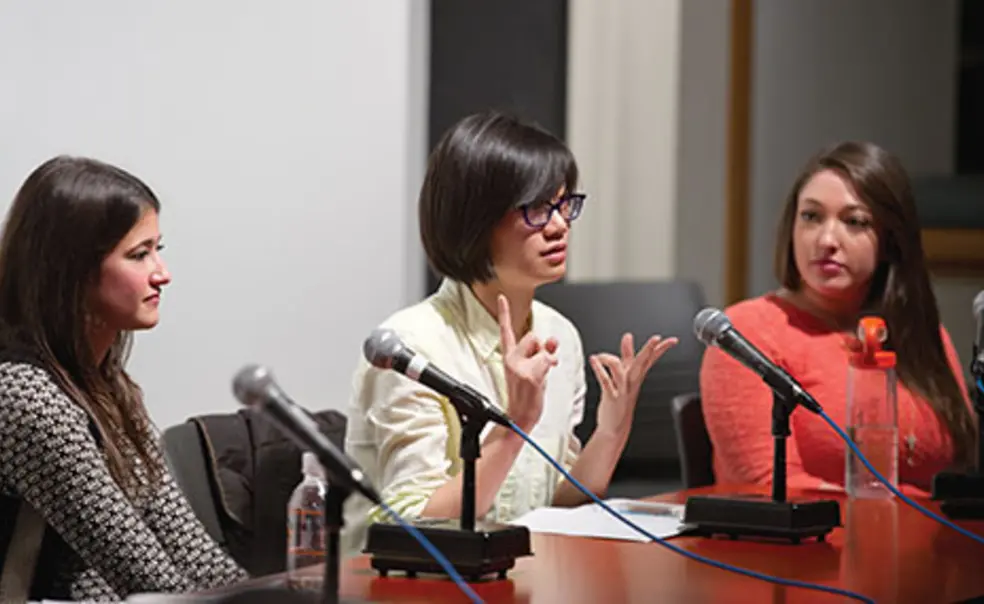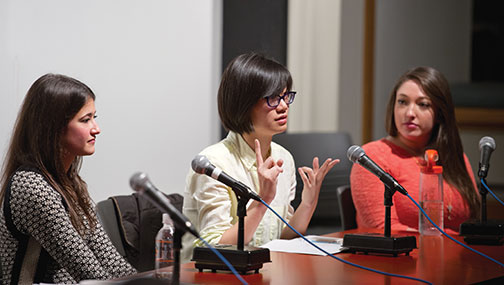Preparing to Lead
First woman in 11 years to head USG as gender-equality efforts continue
Ella Cheng ’16 is the first woman to be elected Undergraduate Student Government president in more than a decade, and while her victory follows recent University efforts to promote women’s leadership, she says she found that “being a girl, you’re going to receive criticism that the male candidate won’t.”
Five years after the Steering Committee on Undergraduate Women’s Leadership (SCUWL) was created by then-president Shirley Tilghman out of concerns that undergraduate women were underrepresented in student leadership positions, academic prizes, and postgraduate fellowships, advocates say that much still needs to be done to secure gender equality.
A poster campaign led by the Women’s Center in the fall called attention to gender stereotypes on campus with slogans that included “USG: Where men are presidents and women are secretaries” and “Bicker: Where women line up by weight.”
The SCUWL group, comprising faculty members, administrators, and undergraduates, published its findings in a 100-page report in March 2011. It offered recommendations in five broad areas to help women realize their potential both inside and outside the classroom: orientation activities, mentoring, faculty awareness, leadership training, and continued monitoring and research needed to meet goals.
One recommendation, which was implemented, called on faculty to encourage high-achieving female students to apply for fellowships, according to Deborah Prentice, dean of the faculty. SCUWL reported that 0.7 women per 1,000 graduating seniors in the 2000s won Rhodes scholarships at Princeton, compared to 1.7 men per 1,000. The year after the report was published, six women won Rhodes and Marshall scholarships, and last November, two of the three 2015 Rhodes scholars were women.
“The faculty were shocked that the women weren’t winning fellowships because in many, many departments, my colleagues would say that so many of our strongest students were women — how could they not win fellowships? So it was just taking that extra step and encouraging some to apply,” Prentice said.
In another response to the report, the Princeton Women’s Mentorship Program was created after many women had cited the importance of encouragement from another person to pursue a leadership role. The mentorship program has enrolled more than 200 people in “pods,” each made up of four undergraduate women of different class years and one faculty or staff member or a graduate student.
An advisory committee formed last May is focusing on student initiatives such as the mentorship program, said Associate Dean Tara Christie Kinsey ’97. She hopes the group will develop policies directed toward faculty, increase outreach with alumnae, and develop metrics to track progress, she said.
“If there are obstacles that still stand in the way of women reaching their full potential, then my alma mater is not living up to the ideals of coeducation,” Kinsey said.
At a December panel, three USG presidential candidates — Cheng and Molly Stoneman ’16, who ran this year, and Catherine Ettman ’13, who ran in 2011 — described how the SCUWL report remains relevant today. Cheng, who has served on the USG Senate since freshman year, recalled how Carmina Mancenon ’14 encouraged her to run for Senate and helped her conduct a door-to-door campaign. “Carmina, who was vice president at the time, knocked on the first few doors with me, which was such a great support,” Cheng said.
The candidates described how gender issues had surfaced during their campaigns. In the recent USG election, derisive comments posted anonymously on The Daily Princetonian website and Yik Yak, a social-media app, targeted the two female presidential candidates.
“Your reputation on the Street will be analyzed,” Cheng said. “Your reputation in hookup culture will be analyzed. You have to draw the fine line between being assertive and confident and not being bitchy.”
The third presidential candidate, William Gansa ’17, focused his campaign on issues of bike reform, waffle fries, and riper fruit, which was seen as a humorous way of critiquing the USG; he won the first round of voting, but lost in the runoff. Cheng said she believed that if a woman had run a similar campaign, it would not have been as successful.
Stoneman, who made women’s leadership one of her campaign issues, stressed the importance of leading by example. The USG’s vice president last year, she said she was “inspired by people before me, of course, and hopefully Ella and I can pass it on.”
In an interview, Tilghman said the issues warrant continued attention.
“Task forces and reports shine a light on the issue for a little while, and when you’re done, it’s easy for people to brush it off,” she said. “You need eternal vigilance for now, because these are deep cultural issues and they won’t go away in a flash.”
Report on campus leadership documents gender disparities













No responses yet